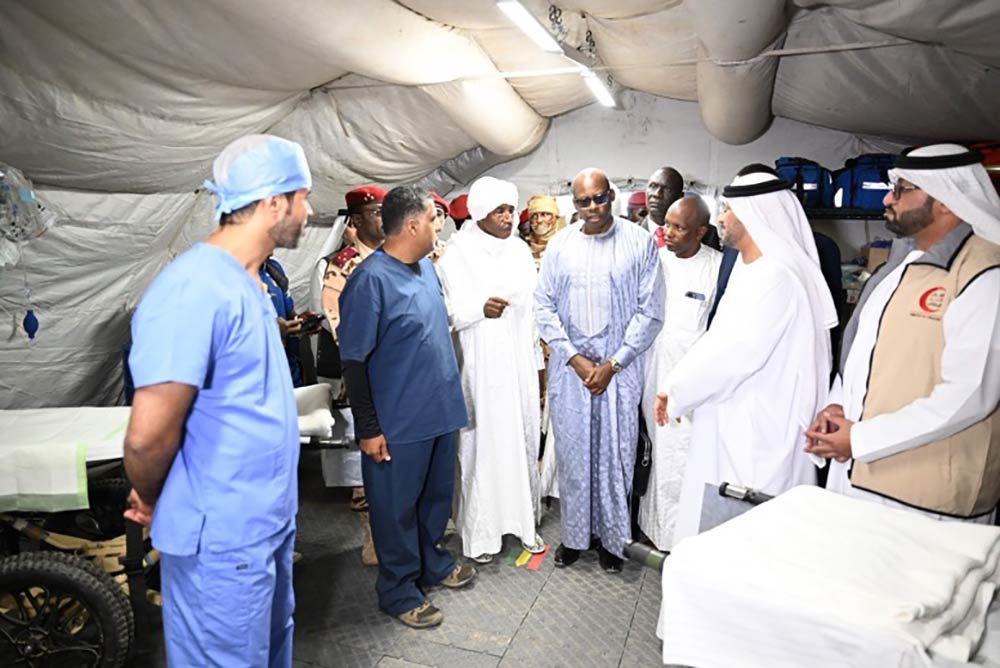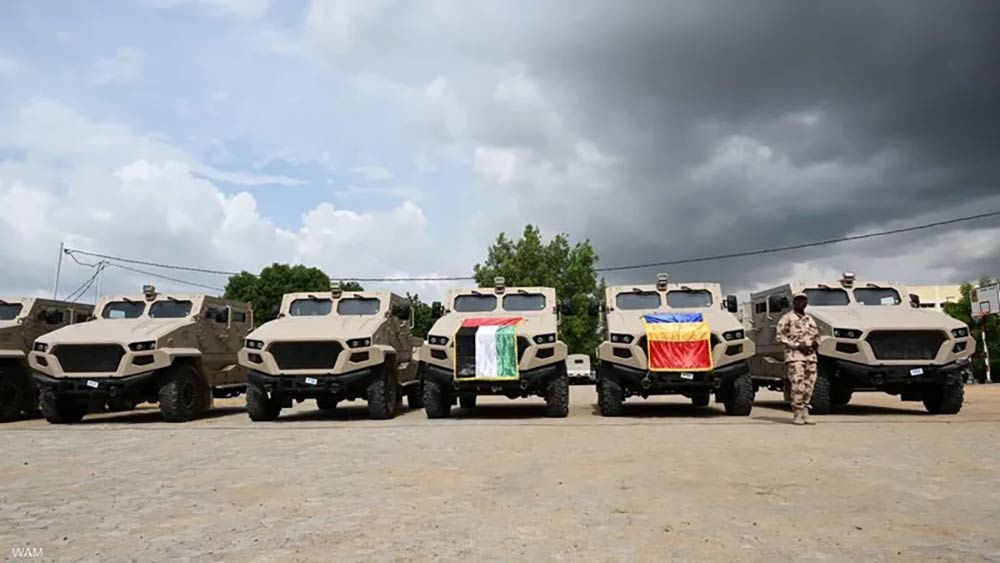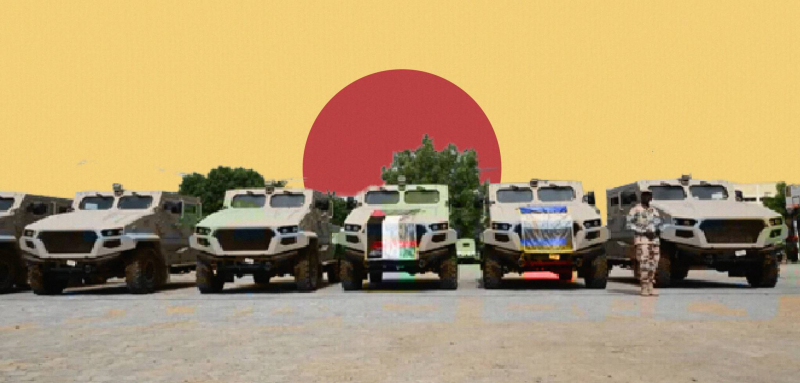Since the outbreak of the conflict in Sudan involving the army and the Rapid Support Forces (RSF) on April 15th, accusations have been directed at the RSF for allegedly enlisting mercenaries from West and Central African countries, with Chad in particular under scrutiny, to fight in their ranks. This suspicion is backed by the fact that the Arab tribes in the Darfur region, which constitute the social incubator of the RSF, have close ties with Arab tribes in those countries. Moreover, some of these relationships extend to political support concerning dealings with ruling regimes and African tribes embroiled in lengthy conflicts with them.
Raseef22 spoke to an eyewitness of the ongoing recruitment operations in N'Djamena, the capital of Chad, where young Chadians are being groomed and pushed into service in the RSF, under the supervision of Chadian military officers. These recruits, along with deliveries of arms and ammunition to the RSF, have been financed and coordinated by the United Arab Emirates.
Recruitment mechanisms
According to testimonies from Chadian citizens who were recruited and found themselves fighting in the ranks of the RSF, there are two distinctive patterns of recruitment. The first involves luring young individuals under the pretense of enlisting them in the Chadian army. The second method entails making agreements with young men to fight in exchange for specified wages.
With financing and coordination from the United Arab Emirates and under the supervision of Chadian military officers, recruitment efforts for Chadians from N'Djamena are ongoing, aiming to deploy them into the ranks of the Sudanese Rapid Support Forces (RSF)
Raseef22 met a 22-year-old Chadian young man who fell victim to deception and ended up fighting in the ranks of the RSF instead of joining the Chadian army. The story began with a phone call he received from a relative in September of last year, informing him of an opportunity for recruitment within the Chadian army.
The young man recounted that the person responsible for the recruitment process was a Chadian army officer holding the rank of colonel. This officer had invited a group of young men enlisting for conscription, a total of 38 individuals, to his residence in the capital N'Djamena. He informed them that they would be transferred to the city of Am-Djarass, located in the northernmost part of the country near the Sudanese border, for specialized counter-terrorism training.
Before their transportation to the airport via car, each member of the group, all originating from Arab tribes in Chad, was provided a sum of 250,000 Central African CFA francs (Chad's currency), approximately equivalent to $400.
The young man and his comrades boarded an aircraft laden with ammunition at Chad's N'Djamena International Airport, which then touched down in a region near Jabra, located 215 kilometers away from the Sudanese capital Khartoum.
However, Ahmed quickly realized they had been deceived as Rapid Support Forces were waiting for him and his companions around the aircraft at the airport. They were handed weaponry and ammunition, and subsequently, the Chadian group was transported to Khartoum. They were dropped off in a building on Sixth Street. Ahmed recollects, "We arrived in Khartoum to the sound of cannons and missiles. I was in shock, and didn't know what to do. I wasn't prepared for military life at all."
Ahmed boarded an aircraft laden with ammunition departing from Chad's capital, landing 215 km away from the Sudanese capital Khartoum, where he realized they'd been deceived as Rapid Support Forces were waiting for him and his companions around the aircraft
The Chadian group remained situated inside a building, guarded by the Rapid Support Forces, for a week. Curiously, nobody spoke to them, and they did not receive any form of military training during this initial period. They were eventually subjected to military training, focused primarily on the assembly and disassembly of firearms, and were then thrust into combat alongside the Rapid Support Forces.
In the midst of this ordeal, the Chadian young man had successfully managed to establish contact with one of his relatives who had been recruited into the ranks of the Rapid Support Forces in exchange for a monthly salary. With his relative's assistance, Ahmed was able to return to his homeland, Chad. In response to inquiries regarding the fate of the group that had traveled to Sudan with him, Ahmed revealed that they are enduring exceedingly harsh conditions, left to their own devices without care or even rudimentary military training and instruction. They find themselves being thrust into combat, with no possibility of returning, except through personal connections with members of the Rapid Support Forces who could facilitate their return, much like what Ahmed had experienced.
Escaping the clutches of poverty
Unlike the deception that the young man we spoke to experienced along with his companions, Mahdi (pseudonym), a Chadian university graduate, willingly enlisted in the Rapid Support Forces in exchange for a sum of money and a monthly salary of $500. Faced with the hopelessness of finding employment in his home country, where nearly half the population (48%) lived below the poverty line as per the 2020 statistics, Mahdi decided to seek opportunities abroad.
Mahdi recounted to Raseef22, "We were a group of 40 young men who boarded a cargo plane laden with ammunition and weapons at N'Djamena International Airport in the Chadian capital. It transported us to Am-Djarass, a remote region in the northern part of Chad, home to a very small population, featuring a large airport boasting the country's lengthiest runway."
Upon their arrival in the Chadian city, they were met by a contingent of the Rapid Support Forces, who, along with the Chadian recruits and their weaponry, ferried them to Khartoum in off-road vehicles. This transpired at the outset of October. According to Mahdi, approximately 140 Chadian recruits have recently been deployed to conflict zones in Sudan to join the ranks of the Rapid Support Forces.
They were handed weapons and ammunition before the Chadian group was transported to Khartoum, "We arrived in Khartoum to the sound of cannons and missiles. I was in shock and didn't know what to do. No one told us anything. I wasn't prepared for the military"
Accusations have long been levied at the Rapid Support Forces for their recruitment of individuals hailing from Arab tribes in Chad and nations across West and Central Africa. These allegations have become increasingly prominent following the ascendancy of Mohamed Hamdan Dagalo (Hemedti) to power after the overthrow of President Omar al-Bashir. The Rapid Support Forces, however, vehemently deny such claims.
What makes this recruitment initiative particularly noteworthy is its execution from within Chad, in collaboration with Chadian military officers and with financial support from the United Arab Emirates. A report published by The New York Times has highlighted the UAE's support for one of the factions embroiled in the Sudanese conflict through Chad. This is ostensibly carried out under the auspices of providing aid to Sudanese refugees who have sought shelter in Chad.
The reality of UAE relief efforts
Raseef22 engaged with sources in Am-Djarass, the capital of the "Ennedi-Est" region located in the northeastern part of Chad, as well as Chadian soldiers serving at the city's airport. It is in this region that the UAE has established a field hospital and manages the relief efforts for Sudanese refugees through the "Humanitarian Coordination Office".

While the sources chose to remain anonymous, they affirmed that the UAE is orchestrating an operation aimed at bolstering its ally, Mohamed Hamdan Dagalo, the leader of the Rapid Support Forces, in his war against the Sudanese army. Abu Dhabi provides the Rapid Support Forces with state-of-the-art weapons, ammunition, and drones, and undertakes the evacuation and treatment of wounded Rapid Support Forces members. These operations are executed from Am-Djarass Airport, situated on the Sudanese border, where Emirati cargo planes land on a nearly daily basis, which was corroborated by an airport worker who preferred to keep their identity undisclosed.
Raseef22 also spoke to one of the recruits in the first batch, as part of the recruitment operations funded by the UAE. He indicated that the recruitment campaign is intentionally targeting young individuals belonging to Arab tribes while excluding their African counterparts.
Abu Dhabi's money in Chad
The United Arab Emirates (UAE) did not wield significant influence in Chad until the outbreak of the conflict in Sudan. In this regard, Qatar had played a more substantial role by facilitating a peace agreement between the transitional military authority and the political opposition and armed groups in August 2022.
During the early days of July, the UAE erected a field hospital within the city of Am-Djarass. Subsequently, a month later, they extended military assistance to the Chadian army following the signing of a military cooperation agreement by the Chadian transitional president, Mahamat Idriss Déby, during his visit to Abu Dhabi in June 2023.
One cannot help but wonder about the extent of the Chadian transitional president's awareness of the UAE's role, especially in the recruitment of Chadian citizens. A Chadian army officer, in an interview with Raseef22, revealed that the recruitment process was conducted under the directives of the Chadian presidency and was under the supervision of senior military generals within the army. Notably, the recruitment primarily targeted Arab tribes, with a specific focus on the Mehriya, Messiria, and Awlad Rashid tribes, which form the majority of the Rapid Support Forces, whose presence spans across both Chad and Sudan.

Protests were organized by residents of the Am-Djarass region to condemn what they perceived as suspicious activities within the city's airport. The protestors leveled accusations against the UAE, asserting that the UAE was contributing to the conflict in Sudan by exploiting their airport for the transportation of weapons, funds, and ammunition to the Rapid Support Forces, all under the guise of humanitarian assistance. These protestors also emphasized that their city was not a refuge station for Sudanese individuals, as those were primarily located in the border region of Adré, which stands as the closest city to Am-Djarass. This information corresponds with a report by the BBC on Sudanese refugees in Chad, which concludes that Am-Djarass does not serve as a transit point for Sudanese refugees.
Within this same context, Yaya Dillo Djerou, the president of the opposing Socialist Party, took to his Facebook page to voice concerns about the UAE's role in his country. He pointed out, "The relations between the military council and the UAE are highly problematic and require transparency for the Chadian people to fully comprehend the true motivations behind this state's presence in Chad. Development should not serve as a facade for enigmatic financial deals and clandestine activities. We vehemently reject this, as we are well aware of the adverse consequences that may arise from this enigmatic collaboration."
Raseef22 is a not for profit entity. Our focus is on quality journalism. Every contribution to the NasRaseef membership goes directly towards journalism production. We stand independent, not accepting corporate sponsorships, sponsored content or political funding.
Support our mission to keep Raseef22 available to all readers by clicking here!
Interested in writing with us? Check our pitch process here!





